Decade in the Mirror: Ian Hanson’s Dolphin Divinity – From Geoff Huegill Returns To A Giant Slayer Named Arnie
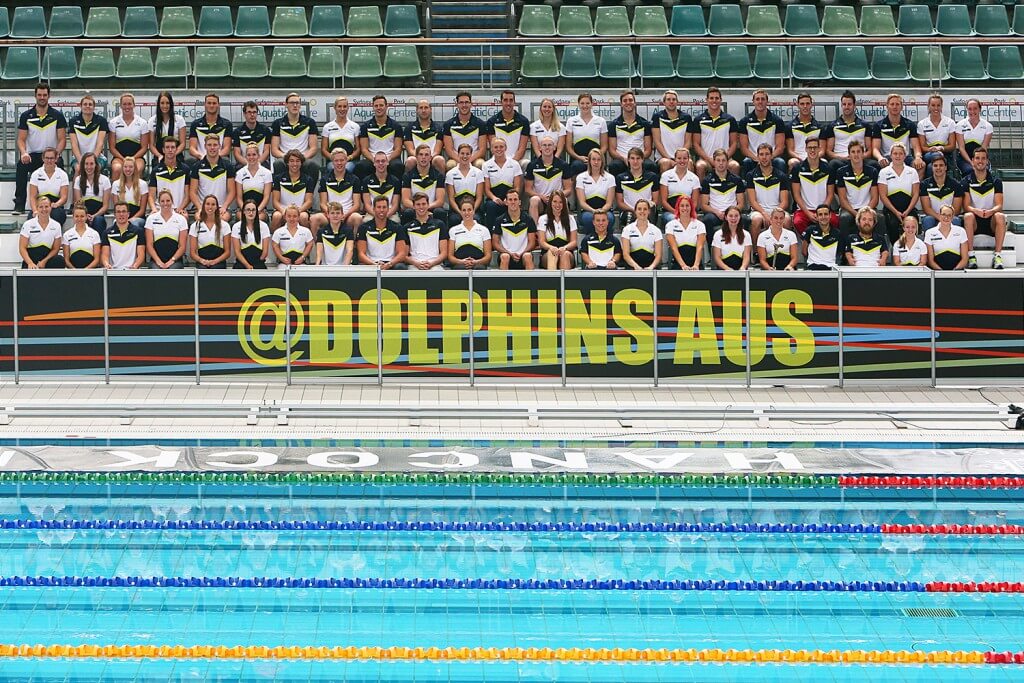
There were so many great highlights from Australian swimmers through the decade beginning in 2010 and about to end. Highlights to celebrate included Olympic and Paralympic champions, World and Commonwealth Games champions and a popular comeback from one of the sport’s real characters in Geoff Huegill, who kick-starts our highlights of a decade to remember Down Under. My selection of Dolphin Divinity ends with the moment a Tasmanian-born Queensland teenager Ariarne “Arnie” Titmus claimed a scalp to remember.
Our Decade in the Mirror series of Top 10s so far:
- Decade In The Mirror: Liz Byrnes – My Top 10 European Moments Led By Adam Peaty’s Venture Into Outer Orbit
- Decade In The Mirror: Sabrina Knoll’s Top 10 Favourites Speak To The Athletes’ Voice
- Decade In The Mirror: Dan D’Addona – My Top 10 NCAA Highlights Led By Dressel’s Dominance
- Decade In The Mirror: Andy Ross – My Top 10 Led By Podium Protests
Ian Hanson’s Top 10 (which turns out to be a top 12: we’ll forgive him two bonus entries) of Dolphin Divinity … in chronological order – Through The Lens Of Our Oceania Correspondent
Geoff Huegill wins battle of the bulge in 2010
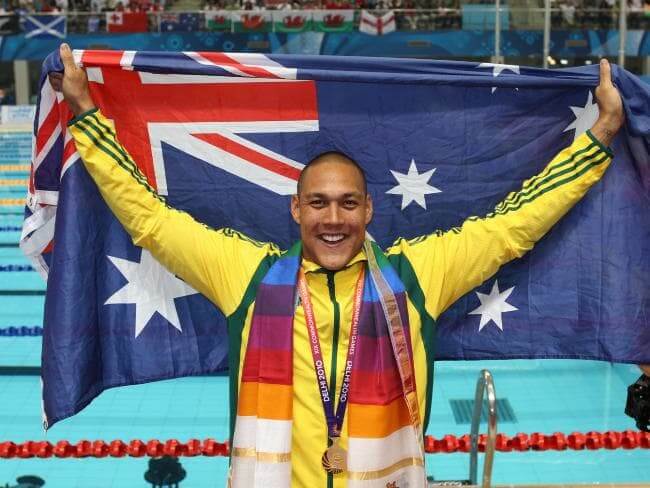
Geoff Huegill. Photo Courtesy: News Ltd.
Without doubt the story of 2010 was the return of 2000 and 2004 Olympian Geoff Huegill and his well-publicised weight loss story to end all weight loss stories. “Skippy” as he is know around the swimming globe dropped a whopping 45 kilos to stage one of swimming’s greatest comebacks to win Commonwealth Games gold in his specialist 100m butterfly in Delhi.
At 31, Huegill had admitted he feared death at a young age as he battled with a body that ballooned to massive 138 kilos – a far cry from the 88-kilo ‘Adonis’ who won Olympic silver and bronze in Sydney 10 years earlier.
Huegill had risen to be one of the poster boys of the sport in a golden era of the late 1990s and early 2000s, winning world championship gold and setting world records under master coach and mentor Ken Wood. His comeback from 2008 to 2010 was a truly remarkable effort from one of the world’s best ever butterfly swimmers.
James Magnussen breaks world title drought at 2011 Worlds
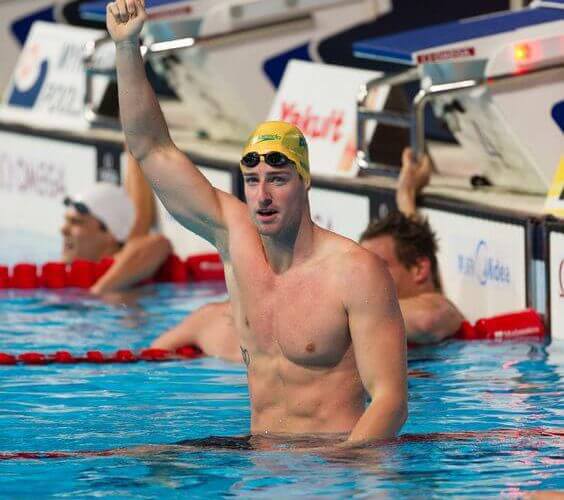
James Magnussen. Photo Courtesy: Delly Carr (Swimming Australia).
James Magnussen, the boy from Port Macquarie and nicknamed “The Missile” landed with a bang into swimming’s fast lane at the 2011 Fina World Championships, in Shanghai, becoming Australia’s first ever world champion over 100m freestyle. It was the start of a stellar career as one of the world’s great sprint freestylers, winning gold in 47.63 after clocking the fastest ever textile suit time of 47.49 in Australia’s 4x100m freestyle relay victory over the US. (Magnussen would later lower that time to a sizzling unofficial world record of 47.10 at the 2012 Olympic Trials).
He would finish second, just 0.01 of a second behind American Nathan Adrian in a thrilling London 2012 Olympic final- Adrian winning gold in 47.52 to Magnussen’s 47.53. “The Missile” and his teammates Matt Targett, Eamon Sullivan, James Roberts, Cam McEvoy and Tommaso D’Orsogna would return home to face the music for their roles in a “Stillnox bonding session” in the pre-Games camp in Manchester. They were fined and given “deferred suspensions for breaches of their behavioral obligations.”
Magnussen would go on to successfully defend his world crown in Budapest in 2013, retiring in 2019 after a decorated career and a troublesome shoulder injury.
Alicia Coutts’ Olympic medal haul equals Thorpe and Gould in 2012 London blitz
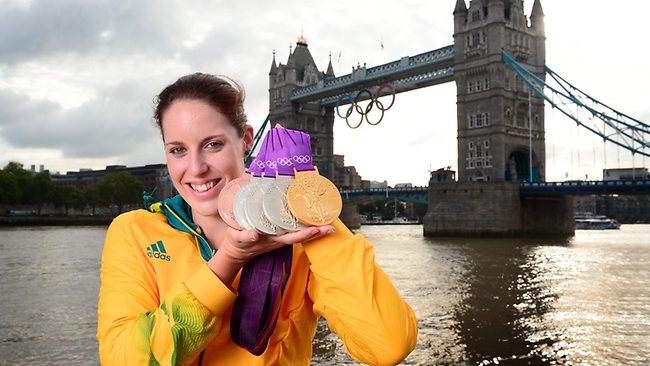
Alicia Coutts. Photo Courtesy: Getty Images.
The London Olympics in 2012 was Alicia Coutts time to shine – swimming her way to five medals – one gold, three silver and one bronze, joining the legendary Ian Thorpe (Sydney 2000) and Shane Gould (Munich 1972) as only the third Australian to win five medals at one Olympic Games. Queensland-born Coutts, swimming at the National Training Centre under coach John Fowlie in Canberra would kick-start her campaign with Olympic gold alongside Cate Campbell, Melanie Schlanger and Brittany Elmslie in the Olympic record-breaking 4x100m freestyle relay, before adding bronze in the 100m butterfly on night two; silver in the 200m individual medley on night four; anchoring the 4x200m freestyle to silver on night five before a third silver, swimming the butterfly leg in the 4x100m medley relay on a sterling final night.
It capped a stunning career that would see her win a further five silver medals at the 2013 World Championships, before retiring after the 2016 Olympics that saw her finish fifth in the 200m individual medley.
Matt Cowdrey crowned Australia’s greatest Paralympian in 2012
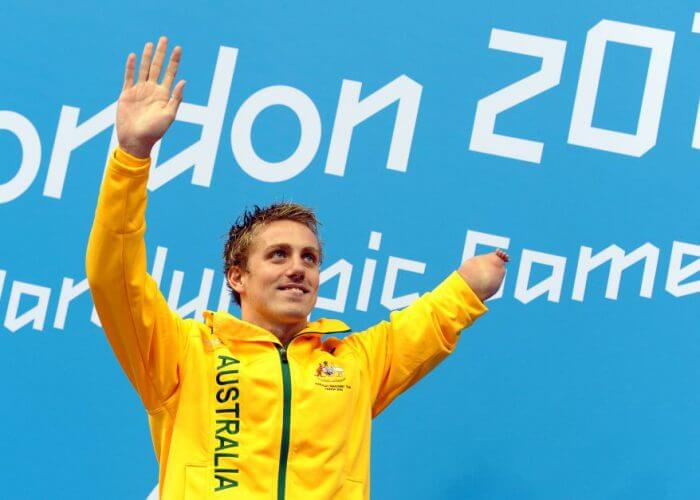
Matt Cowdrey. Photo Courtesy: Getty Images.
Matt Cowdrey soared into the history books with his five-gold medal haul at the London Paralympics – taking his overall tally to 23 medals – 13 of them gold from three Games – Athens, Beijing and London and making him the greatest Australian medal winner in history. Cowdrey, who has a congenital amputation of his left arm, won gold medals in the 100m backstroke S9, 50m freestyle S9, 100m freestyle S9, 200m individual medley SM9 and 4×100m freestyle relay (34 points).
He also won silver medals in the 100m butterfly S9 and 100m breaststroke SB8 and a bronze as a member of the 4×100-metre medley relay (34 points). Through his three Paralympic campaigns, Cowdrey completed the 100m freestyle/200 IM treble. By London he had become the was the face of Australian Paralympic sport and in 2019 was inducted into the Australian Sports Hall of Fame. He retired in 2015 and entered politics in his native South Australia.
Cate Campbell all power to take 100m freestyle world title in 2013
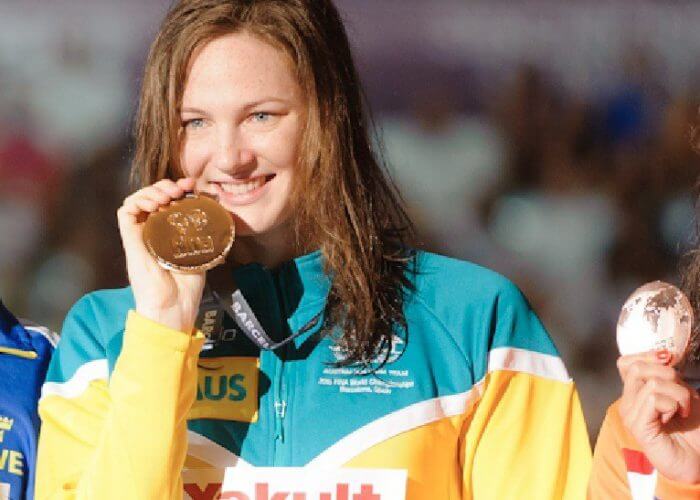
Cate Campbell. Photo Courtesy: Delly Carr (Swimming Australia).
The 2013 World Championships in Barcelona saw Malawi-born Queenslander Cate Campbell stake her claim as one of the world’s great female freestyle sprinters. She became the third Australian to win the coveted 100m freestyle crown behind Olympic champions Jodie Henry (2005) and Libby Trickett (then Lenton) in 2007.
But it was the way she went about it and the standard of the field she beat that captured the imagination of the swimming world. Campbell’s awesome power and early speed saw her open up almost a full body length on the field after the first 40 metres and she led Sweden’s Sarah Sjostrom by almost three-quarters of a second at the turn, powering home to beat Sjostrom and Dutchwoman Ranomi Kromowidjojo with world record holder Britta Steffen fifth. Campbell had established herself as the next real force in world sprinting, with little sister Bronte hot on her heels.
Clan McKeon arrive in style in Glasgow in 2014
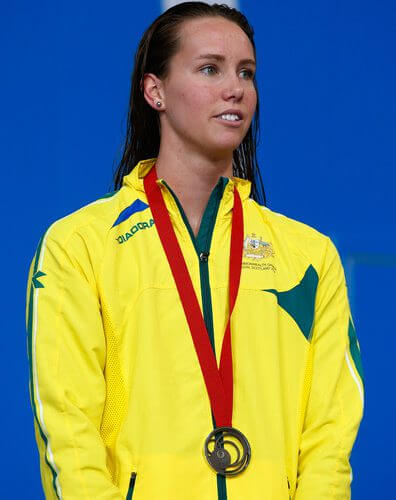
Emma McKeon Photo Courtesy: Delly Carr (Swimming Australia).
McKeon power arrived in style at the 2014 Glasgow Commonwealth Games with Emma McKeon making her Games debut with six medals – four of them gold –while 2012 Olympian brother David claimed gold in the 4x200m freestyle and silver in the 400m freestyle.
Emma’s haul included the individual 200m freestyle gold and in all of Australia’s winning relays, the 4x100m freestyle, 4x200m freestyle and 4x100m medley.
It was a glittering start for the siblings, who would go on to qualify together for the Rio Olympics – following father Ron himself a two-time Olympian and bronze medallist in Moscow and Commonwealth Games gold medallist. Emma went on to win four medals in Rio – gold in the world record breaking 4x100m freestyle with the Campbell sisters Cate and Bronte and Brittany Elmslie and silver in the 4x200m freestyle and 4x100m medley and bronze in the 200m freestyle.
Emma has become a valuable commodity for the Dolphins with her freestyle and butterfly prowess and key roles in all of Australia’s relay teams, amassing 17 gold, 12 silver and 11 bronze medals in a career that has also seen her compile four gold, nine silver and four bronze from four World Championship campaigns – including three gold in the 4×100, 4×200 freestyles and 4x100m mixed medley relays in Gwangju in 2019.
Tokyo 2020 awaits the Dolphins MVP as the Aussies mount a serious Olympic challenge with Emma McKeon very much a key component, while David is mounting a challenge of his own for a third Olympics after undergoing shoulder surgery.
Bronte Campbell swims out of Cate’s shadow to double sprint gold in Kazan 2015
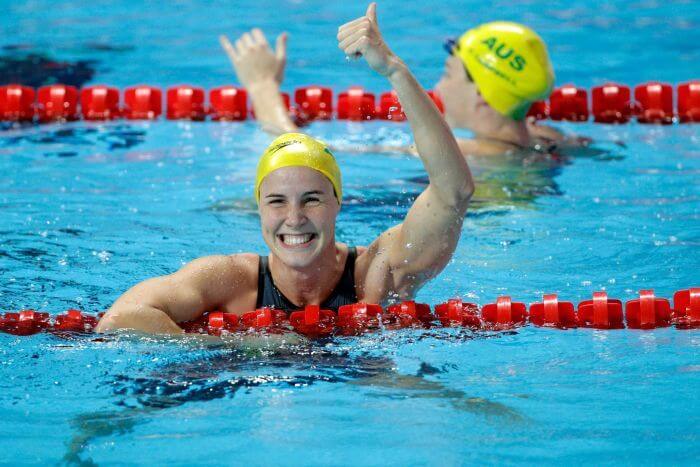
Bronte Campbelll. Photo Courtesy: Getty Images.
The 2015 World Championships saw the younger Campbell sister Bronte emerge from sister Cate’s shadow to claim gold in both the 50 and 100m freestyle – joining a select group to win the blue ribbon freestyle sprint double, which includes fellow Australian Libby Trickett (as Libby Lenton in 2007), Inge de Bruijn (2001), Britta Steffan (2009) and Simone Manuel (2019). Campbell (or C2) followed defending champion and sister Cate onto the top of the podium in 2015 with a Campbell girl again lowering Sweden’s Sarah Sjostrom to silver with Cate (C1) taking the bronze.
Then came the 50m freestyle and again it was Bronte’s day, taking the gold from Dutch girl Ranomi Kromowidjojo and Sjostrom. Earlier in the meet the Campbell girls combined with Emma McKeon and Emily Seebohm to win gold in the 4x100m freestyle relay. The meet also saw Seebohm and Mitch Larkin become the first Australians to win the 100/200m backstroke double. Bronte Campbell and Seebohm would be crowned joint Australian Swimmers of the Year while Larkin, who has enjoyed a world record breaking short course season would be named Fina’s Male Swimmer of the Year.
Gold Rush In Rio: Kyle Chalmers and Mack Horton Steal The Show
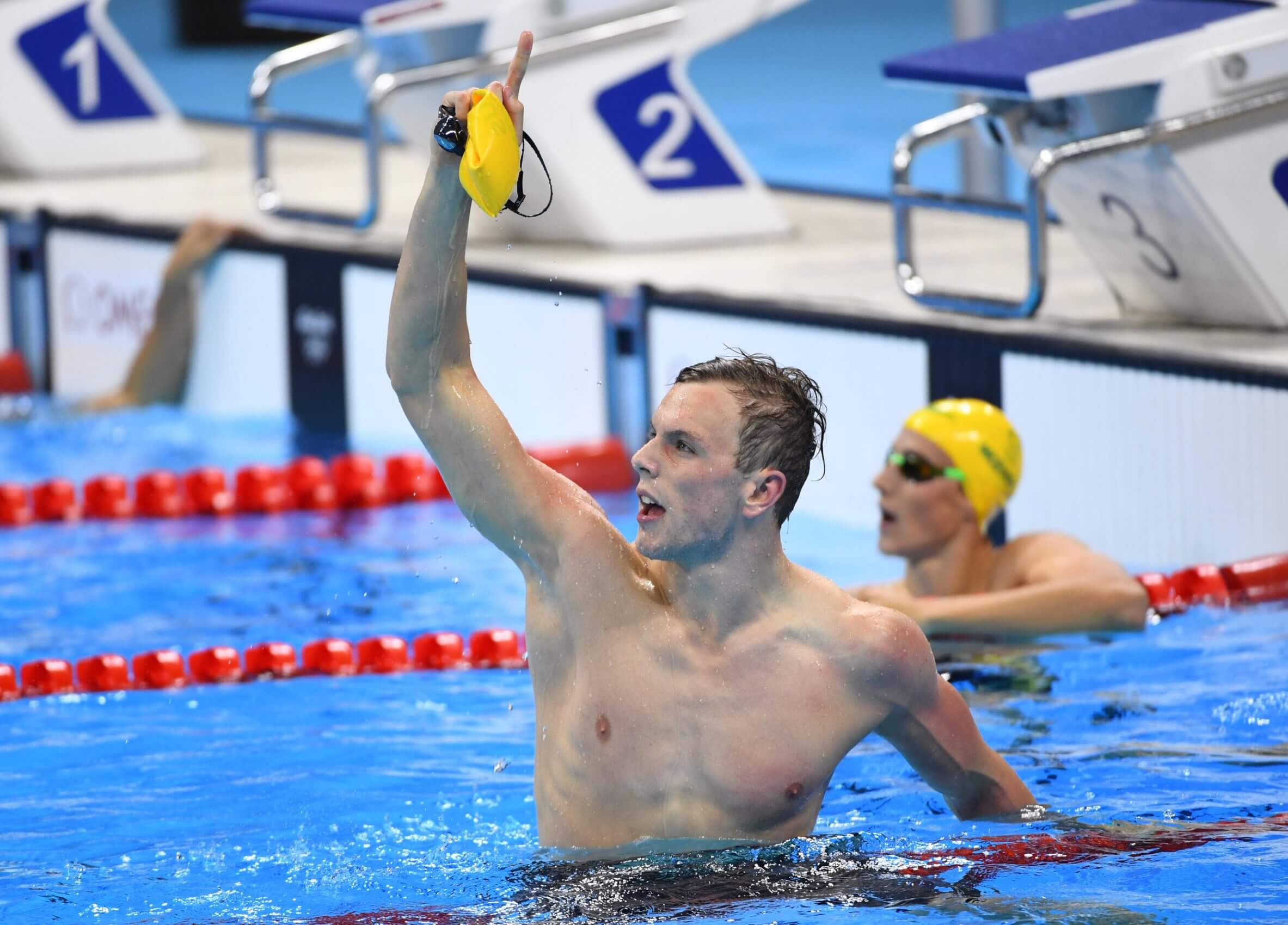
Photo Courtesy: Rob Schumacher-USA TODAY Sports
It had been a long time between drinks for Australia’s men when it came to individual Olympic gold – 12 years in fact from when the legendary Ian Thorpe had won the 200/400m freestyle double at the 2004 Games in Athens. But Rio 2016 was well worth the wait when Kyle Chalmers (100m freestyle) and Mack Horton (400m freestyle) stood on top of the dais – crowned Olympic champions.
Chalmers, with a dynamic final 50m, over-powered the field to become the fourth Aussie to win the coveted blue ribband sprint event, joining Jon Henricks (1956), John Devitt (1960) and Michael Wenden (1968) as the next Olympic champion.
Horton out-touched China’s defending champion Sun Yang with a classic finish in what would develop into one of the major controversies of the Games when Horton accused Sun of being a drug cheat (a story line that would again raise its head with Horton’s decision not to stand on the podium with Sun at the 2019 Worlds). Horton’s Olympic gold continued a proud history in the Olympic 400m freestyle, with Thorpe having won in 2000 and defending in 2004 after the late Murray Rose having won in 1956 and defending in 1960 and Brad Cooper awarded the gold in 1972 in Munich. Horton now has his sights set on a successful defence in 2020. The biggest question is whether the controversial Sun Yang will also be there?
Seebohm’s stunning defensive effort in Budapest 2017
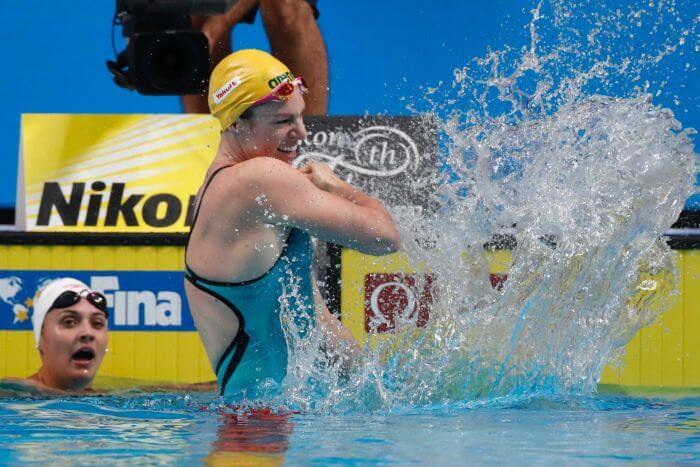
Emily Seebohm. Photo Courtesy: Delly Carr (Swimming Australia).
Defending a world title is often thought of as one of the toughest tasks in sport with Libby Lenton (Trickett) 50m freestyle in 2005 and 2007; Leisel Jones 100 and 200m breaststroke in 2005 and 2007 and Jessicah Schipper the 200m butterfly in 2007 and 2009 the only Aussie women to do so before Emily Seebohm joined that exclusive club in 2017, after her stunning 100/200m double in Kazan in 2013.
Seebohm, who debuted for the Dolphins at the 2007 World’s in Melbourne at 14, swam her way into the annals of swimming in Australia with her decisive defence in Budapest, upsetting local hero Katinka Hosszu into the bargain, after the Australians had fought so hard to win that elusive individual gold – in fact the only individual gold.
Australia had gone without gold through the first six days of the world titles but on the penultimate night Seebohm, 25, clocked 2:05.68 – a new Australian record to sink local hero Katinka Hosszu and Kathleen Baker from the US.
It capped a remarkable comeback for Seebohm, who considered walking away from the sport after health issues sabotaged her Rio Olympic campaign.”I am just amazed at what I have been able to achieve tonight,” said Seebohm. “But if I had won or lost tonight I would have been so proud of my performances and what I have overcome.” It was also an enormous relief to an Australian team that had been running out of time to finally register gold.
Mitch Larkin’s record-breaking Gold Coast gold rush of 2018
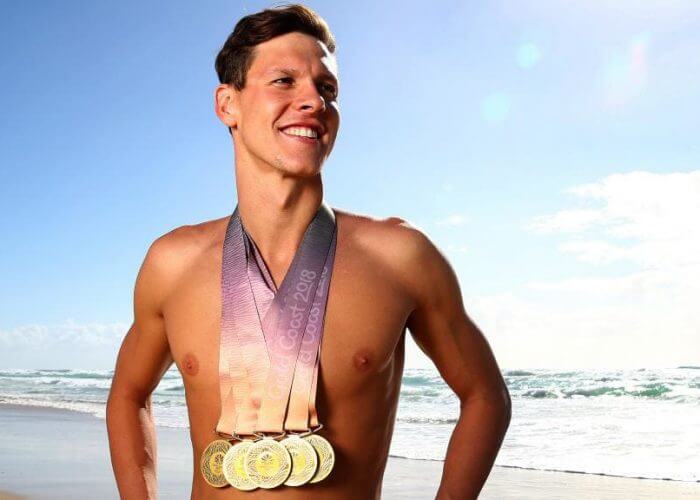
Mitch Larkin. Photo Courtesy: Gold Coast Bulletin.
Mitch Larkin owned the 2018 Commonwealth Games on the Gold Coast, winning five gold medals and becoming the first male swimmer to win four individual gold medals at one Games and the first swimmer to win every backstroke event a single Commonwealth Games. Ian Thorpe may have won six gold medals in Manchester in 2002 – three individual and three relays; as Susie O’Neill did in Kuala Lumpur in 1998 but Larkin equalled individual gold with Hayley Lewis, who won five gold, four individual in Auckland in 1990.
Larkin’s five gold medals came from men’s 50m, 100m and 200m backstroke; 200m individual medley and 4 x 100m medley relay. After linking back up at his old club at St Peters Western, under former assistant-cum head coach Dean Boxall, Larkin clicked back into the form that saw him win double World Championship gold in Kazan in 2015. Boxall claimed Larkin could not only return to the peak of his powers but actually win five gold medals at the Commonwealth Games that only fueled the desire of a man convinced his best was yet to come.
“I wouldn’t have met with Dean if I didn’t think I had more to give,” Larkin said at the time. “I haven’t reached my full potential, I don’t think yet and I love the sport. There hasn’t been one day in training over the last six months that I’ve hated. It’s been hard, it’s been tough but it’s been awesome.” Larkin said he had learnt he could not escape the hard work. A story of redemption and no better place to do it than in your own backyard.
Cate’s golden six, packs a Pan-Pac Punch in Tokyo 2018
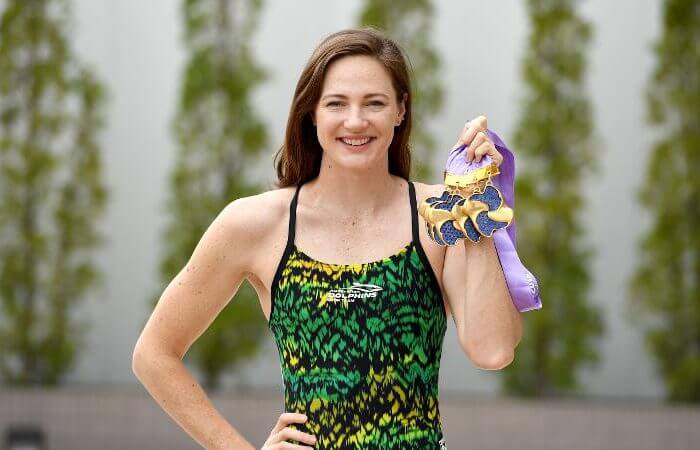
Cate Campbell. Photo Courtesy: Delly Carr (Swimming Australia).
A RESURGENT Cate Campbell won five gold medals, including the 50 and 100m freestyle sprint double, to finish with the best individual haul at 2018 Pan Pacs in Tokyo. Campbell led Australia to second place on the medal tally, the Dolphins finishing with eight gold, 12 silver and seven bronze.
Having banished her Rio demons with a win the 100m freestyle earlier in the meet, Campbell also anchored the mixed medley relay, women’s sprint relay and medley relay to gold, while the Dolphins women also won the 4x200m relay to sweep the women’s team events. “I think that this team has performed way beyond expectations and we’ve really stuck it to people (with) the girls winning all of the relays,” Campbell said at the time. It just goes to show the grit and determination and the spirit that is really alive in the team and it is wonderful to be a part of it again.”
While Campbell’s 100m win on Friday night was the redemption she has craved since the Rio Games, her win in the 50m on the final night, just 0.14sec outside the world record, was just as good. The slowest swimmer in the field off the blocks, Campbell (23.81sec) set the eighth-fastest time in history in the one-lap dash to continue her outstanding meet. She finished well ahead of American Simone Manuel (24.22), with Australia’s Emma McKeon third in 24.34.
Campbell missed the 2017 world championships during a post-Olympic sabbatical but returned to the international scene in outstanding form and said Australia had struck a blow against the US in Tokyo. “Remember when our 4x100m relay team smashed the US like guitars in Sydney? I would say we have definitely put them on notice,” she said at the time. “I am on the right track. It’s definitely been my most consistent meet in a very long time which is really nice,” she said….”probably my most consistent, fastest swimming.”
Arnie terminates Ledecky domination in Gwangju 2019
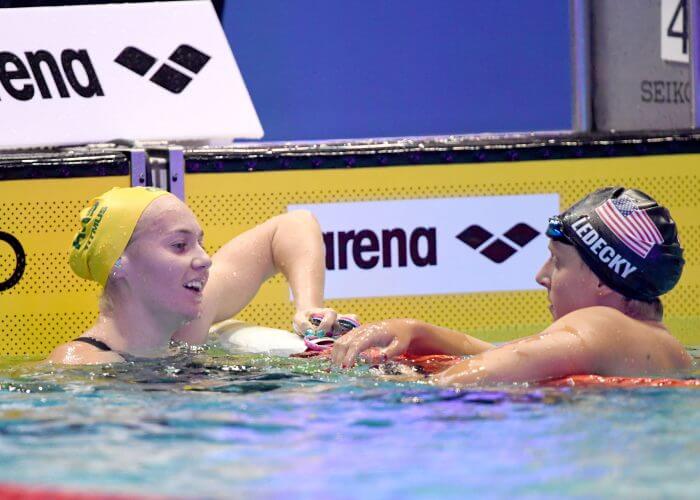
Ariarne Titmus and Katie Ledecky. Photo Courtesy: Delly Carr (Swimming Australia).
Before her 2019 September 8 birthday, a then 18-year-old Ariarne Titmus did the unthinkable, swimming over the top of the world’s greatest ever women’s freestyler, US golden girl, multiple Olympic and World Champion Katie Ledecky. Titmus broke Ledecky’s extraordinary seven-year unbeaten run over 400, 800 and 1500m freestyle to claim Australia’s first gold on night one of the Gwangju World Championships.
The Dean Boxall-coached Titmus clocked a superb PB of 3:58.76 (27.52; 57.12; 1:57.72; 2:28.03; 2:58.45; 3.29.25) – a new Commonwealth, Oceania and Australian record – the second fastest swimmer over 400m in history. The Tasmanian-born Brisbane-based Commonwealth champion came home all over Ledecky after trailing her going into the final turn to become the new world champion – our first in the women’s 400m freestyle since Tracey Wickham in Berlin in 1978.
Titmus clocked the fastest final split of the night in 29.51 – while Ledecky touched in the second slowest split of 31.34 – her legs hardly making a splash. Australia’s latest swimming star, who said after the race: “I never thought I would be in a situation where I would be mowing Katie (Ledecky) down – she is such a champion – so I tried to make the most of it. I am happy that I got the job done, I can still see room for improvement.” And how does she feel? “I feel pretty normal, it was just a swimming race…there was no pressure really coming into this race. I just wanted to fight as hard as I could – in that last 50m I gave it everything. “My coach Dean Boxall said to me there were three outcomes; you could swim great, you could swim good, you could swim bad but you will still wake up tomorrow.”



